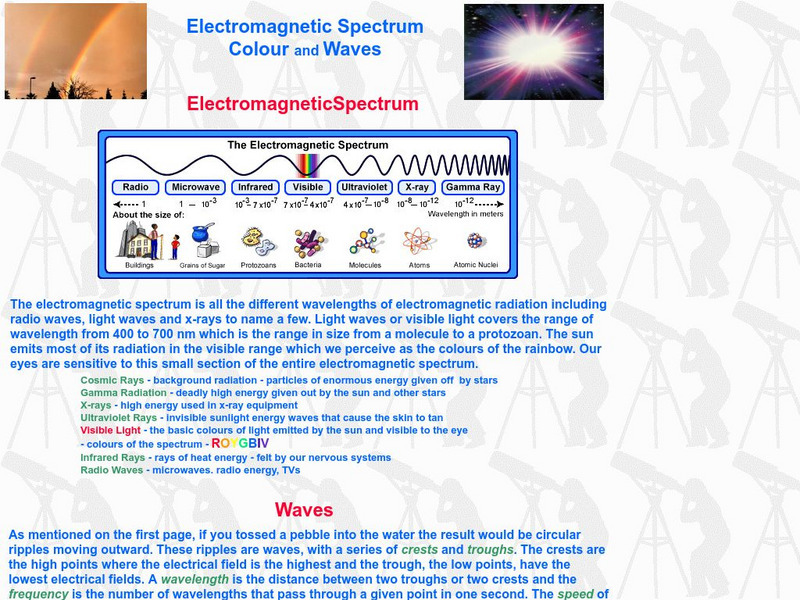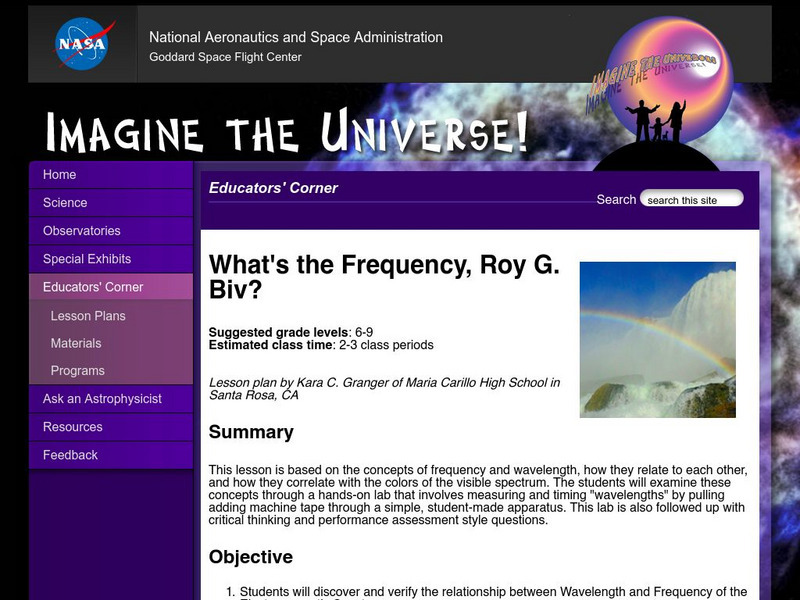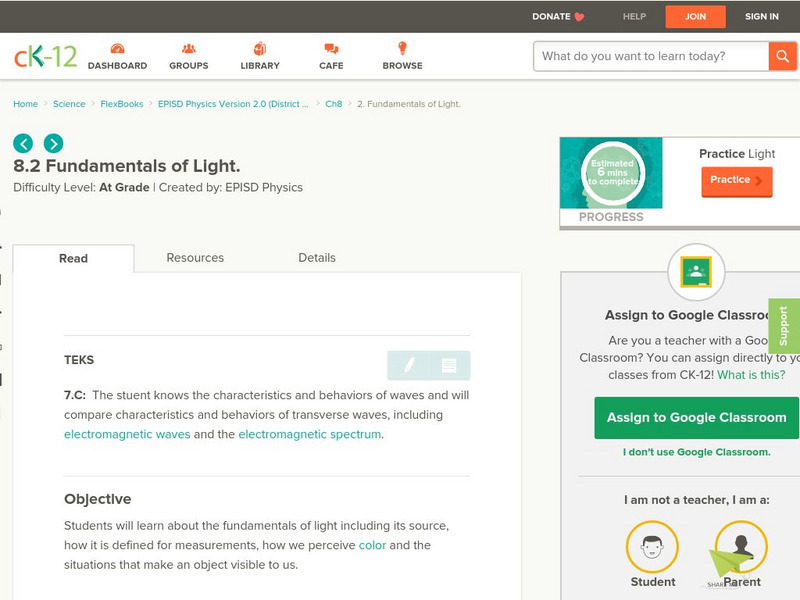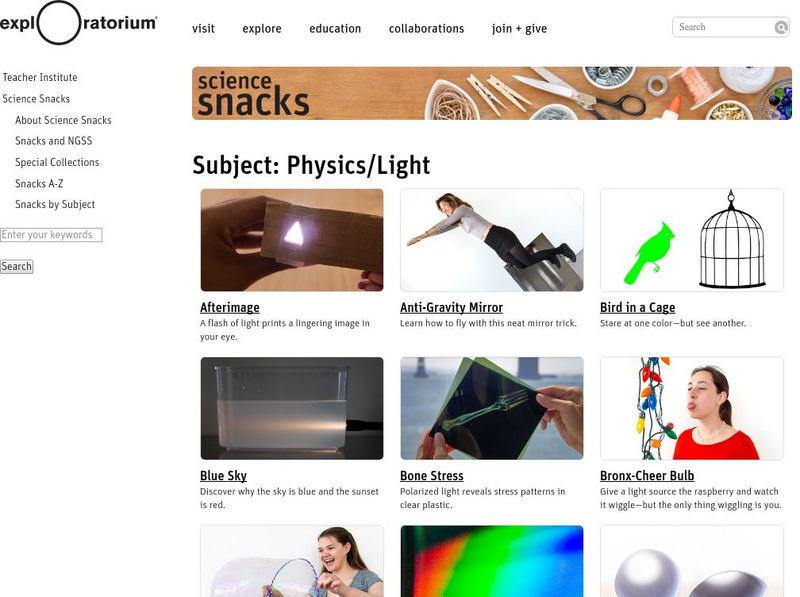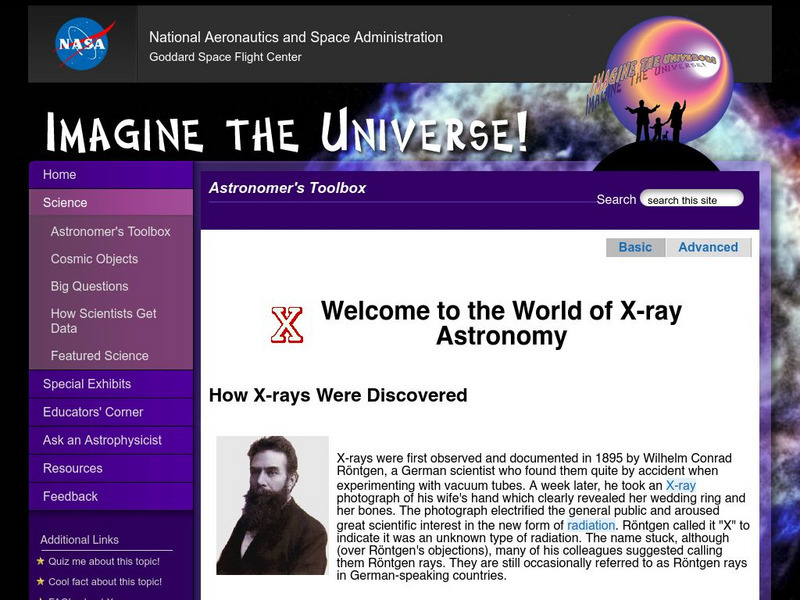My Science Site
Electromagnetic Spectrum: Colour and Waves
This resource provides information on the different wavelengths that make up the electromagnetic spectrum. Also contains information on waves and color.
TeachEngineering
Teach Engineering: Visible Light and the Electromagnetic Spectrum
In this instructional activity, the electromagnetic spectrum is explained and students learn that visible light makes up only a portion of this wide spectrum. Students also learn that engineers use electromagnetic waves for many...
Alabama Learning Exchange
Alex: Emission Spectrum
We will reintroduce the learners to the electromagnetic spectrum and visible light. We will talk about the states of electrons(ground and excited). The teacher will show a video link (Electrons in Atoms). We will then perform the science...
Science Struck
Science Struck: Electromagnetic Energy and Why It Is Important
Explains what electromagnetic energy is, the history of its discovery, some terms used when talking about it, and gives some facts about it.
Society for Science and the Public
Science News for Students: Understanding Electromagnetic Radiation
Briefly explains the different types of radiation in the electromagnetic spectrum.
Alabama Learning Exchange
Alex: Ultraviolet Radiation
An interactive PowerPoint will be used to introduce the electromagnetic spectrum. Learners use UV beads to observe changes caused by the sun's rays and evaluate sunscreen effectiveness. Harmful effects of UV exposure will be described...
Ducksters
Ducksters: Physics for Kids: Light Spectrum
Kids learn about the science of the light spectrum. Wavelengths and frequencies of the electromagnetic waves including visible light, primary colors, and subtractive colors.
NASA
Nasa: Imagine the Universe: What's the Frequency, Roy G. Biv
In this very detailed lesson plan from NASA, students investigate wavelength and frequency within the electromagnetic spectrum.
CK-12 Foundation
Ck 12: Fundamentals of Light
[Free Registration/Login may be required to access all resource tools.] Students investigate the fundamentals of light including its source, how it is defined for measurements, how we perceive color, and the situations that make an...
Science Struck
Science Struck: Wavelength of Light
Describes the characteristics of light, presents two formulas for calculating its wavelength, and provides a table of the different wavelength ranges across the electromagnetic spectrum.
Alabama Learning Exchange
Alex: Understanding Solar Energy. Part 1
This lesson discusses how electromagnetic radiation transfer the sun's energy to earth. This lesson will also talk about the eight types of electromagnetic waves in the electromagnetic spectrum and how each type is used or found in our...
TeachEngineering
Teach Engineering: The Visual Spectrum
In this activity, students make simple spectroscopes (prisms) to look at different light sources. The spectroscopes allow students to see differing spectral distributions of different light sources.
Science Education Resource Center at Carleton College
Serc: How Can We Measure the Wavelength of Light Emitted From Stars?
This activity is designed for students to apply their knowledge of mathematics and physics to "real life" situations. Students are presented with the situation that they are on a camping trip and wish to know the wavelength emitted by a...
Exploratorium
Exploratorium: Science Snacks: Physics/light
Here is a large collection of simple science class activities for understanding the physics of light.
NASA
Nasa: Imagine the Universe: Welcome to the World of X Ray Astronomy
Site recounts how X-rays were discovered as well as who discovered them. Offers graphics, links to facts on this topic, a quiz, and teacher resources.
Khan Academy
Khan Academy: Infrared and Ultraviolet/visible Spectroscopy Questions
Practice questions over infrared and ultraviolet/visible spectroscopy questions.
NASA
Nasa: Space Place: What Is Infrared?
See images and read about examples of infrared rays, and learn how they behave in different conditions.
NASA
Nasa: Imagine the Universe: Welcome to the World of Multiwavelength Astronomy!
This Imagine the Universe site provides an introduction into the multiwavelength universe and astronomy. Site provides graphics, links to a quiz, facts on this topic as well as teacher resources.
TeachEngineering
Teach Engineering: The Energy of Light
For this introduction to light energy, students learn about reflection and refraction as they learn that light travels in wave form. Through hands-on activities, they see how prisms, magnifying glasses and polarized lenses work. They...
